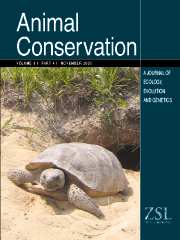Crossref Citations
This article has been cited by the following publications. This list is generated based on data provided by
Crossref.
LAUNDRÉ, JOHN W.
and
Cypher
2005.
PUMA ENERGETICS: A RECALCULATION.
Journal of Wildlife Management,
Vol. 69,
Issue. 2,
p.
723.
Laundré, J.W.
Hernández, L.
and
Clark, S.G.
2006.
Impact of puma predation on the decline and recovery of a mule deer population in southeastern Idaho.
Canadian Journal of Zoology,
Vol. 84,
Issue. 11,
p.
1555.
CHOATE, DAVID M.
WOLFE, MICHAEL L.
and
STONER, DAVID C.
2006.
Evaluation of Cougar Population Estimators in Utah.
Wildlife Society Bulletin,
Vol. 34,
Issue. 3,
p.
782.
Holmes, Brian R.
and
Laundré, John W.
2006.
Use of open, edge and forest areas by pumas Puma concolor in winter: are pumas foraging optimally?.
Wildlife Biology,
Vol. 12,
Issue. 2,
p.
201.
LAUNDRÉ, JOHN W.
HERNÁNDEZ, LUCINA
and
CLARK, SUSAN G.
2007.
Numerical and Demographic Responses of Pumas to Changes in Prey Abundance: Testing Current Predictions.
The Journal of Wildlife Management,
Vol. 71,
Issue. 2,
p.
345.
Kelly, Marcella J.
Noss, Andrew J.
Di Bitetti, Mario S.
Maffei, Leonardo
Arispe, Rosario L.
Paviolo, Agustin
De Angelo, Carlos D.
and
Di Blanco, Yamil E.
2008.
Estimating Puma Densities from Camera Trapping across Three Study Sites: Bolivia, Argentina, and Belize.
Journal of Mammalogy,
Vol. 89,
Issue. 2,
p.
408.
STONER, DAVID C.
RIETH, WENDY R.
WOLFE, MICHAEL L.
MECHAM, MCLAIN B.
and
NEVILLE, ANN
2008.
Long‐Distance Dispersal of a Female Cougar in a Basin and Range Landscape.
The Journal of Wildlife Management,
Vol. 72,
Issue. 4,
p.
933.
Hansen, Andrew
2011.
Sources, Sinks and Sustainability.
p.
339.
Mockrin, Miranda H.
and
Redford, Kent H.
2011.
Potential for spatial management of hunted mammal populations in tropical forests.
Conservation Letters,
Vol. 4,
Issue. 4,
p.
255.
Andreasen, Alyson M.
Stewart, Kelley M.
Longland, William S.
Beckmann, Jon P.
and
Forister, Matthew L.
2012.
Identification of source‐sink dynamics in mountain lions of the Great Basin.
Molecular Ecology,
Vol. 21,
Issue. 23,
p.
5689.
Stoner, David C.
Wolfe, Michael L.
Mecham, Clint
Mecham, McLain B.
Durham, Susan L.
and
Choate, David M.
2013.
Dispersal behaviour of a polygynous carnivore: do cougars Puma concolor follow source‐sink predictions?.
Wildlife Biology,
Vol. 19,
Issue. 3,
p.
289.
Beausoleil, Richard A.
Koehler, Gary M.
Maletzke, Benjamin T.
Kertson, Brian N.
and
Wielgus, Robert B.
2013.
Research to regulation: Cougar social behavior as a guide for management.
Wildlife Society Bulletin,
p.
n/a.
VanWormer, Elizabeth
Conrad, Patricia A.
Miller, Melissa A.
Melli, Ann C.
Carpenter, Tim E.
and
Mazet, Jonna A. K.
2013.
Toxoplasma gondii, Source to Sea: Higher Contribution of Domestic Felids to Terrestrial Parasite Loading Despite Lower Infection Prevalence.
EcoHealth,
Vol. 10,
Issue. 3,
p.
277.
Sollmann, Rahel
Gardner, Beth
Chandler, Richard B.
Shindle, David B.
Onorato, David P.
Royle, Jeffrey Andrew
O'Connell, Allan F.
and
Lukacs, Paul
2013.
Using multiple data sources provides density estimates for endangered Florida panther.
Journal of Applied Ecology,
Vol. 50,
Issue. 4,
p.
961.
Stoner, David C.
Wolfe, Michael L.
Rieth, Wendy R.
Bunnell, Kevin D.
Durham, Susan L.
Stoner, Lisa L.
and
Jeschke, Jonathan
2013.
De facto refugia, ecological traps and the biogeography of anthropogenic cougar mortality in Utah.
Diversity and Distributions,
Vol. 19,
Issue. 9,
p.
1114.
Maletzke, Benjamin T.
Wielgus, Robert
Koehler, Gary M.
Swanson, Mark
Cooley, Hilary
and
Alldredge, J. Richard
2014.
Effects of hunting on cougar spatial organization.
Ecology and Evolution,
Vol. 4,
Issue. 11,
p.
2178.
Robinson, Hugh S.
Ruth, Toni
Gude, Justin A.
Choate, David
DeSimone, Rich
Hebblewhite, Mark
Kunkel, Kyran
Matchett, Marc R.
Mitchell, Michael S.
Murphy, Kerry
and
Williams, Jim
2015.
Linking resource selection and mortality modeling for population estimation of mountain lions in Montana.
Ecological Modelling,
Vol. 312,
Issue. ,
p.
11.
Keehner, Jon R.
Wielgus, Robert B.
and
Keehner, Amy M.
2015.
Effects of male targeted harvest regimes on prey switching by female mountain lions: Implications for apparent competition on declining secondary prey.
Biological Conservation,
Vol. 192,
Issue. ,
p.
101.
Zanón-Martínez, Juan I.
Kelly, Marcella J.
Mesa-Cruz, J. Bernardo
Sarasola, José H.
DeHart, Clark
and
Travaini, Alejandro
2016.
Density and activity patterns of pumas in hunted and non-hunted areas in central Argentina.
Wildlife Research,
Vol. 43,
Issue. 6,
p.
449.
Logan, Kenneth A.
2019.
Puma population limitation and regulation: What matters in puma management?.
The Journal of Wildlife Management,
Vol. 83,
Issue. 8,
p.
1652.




